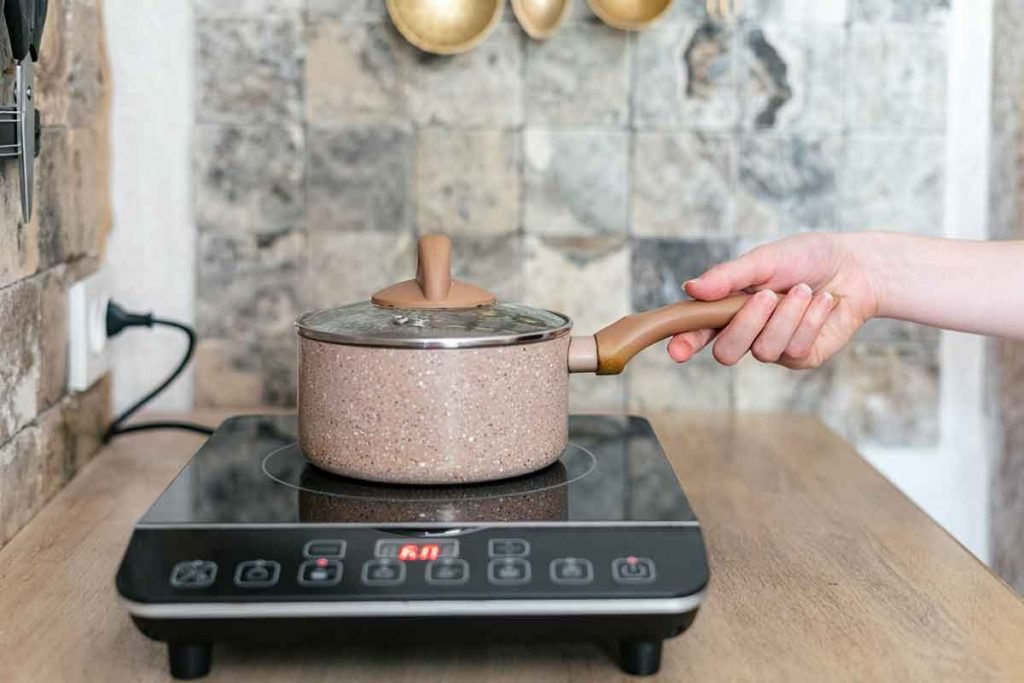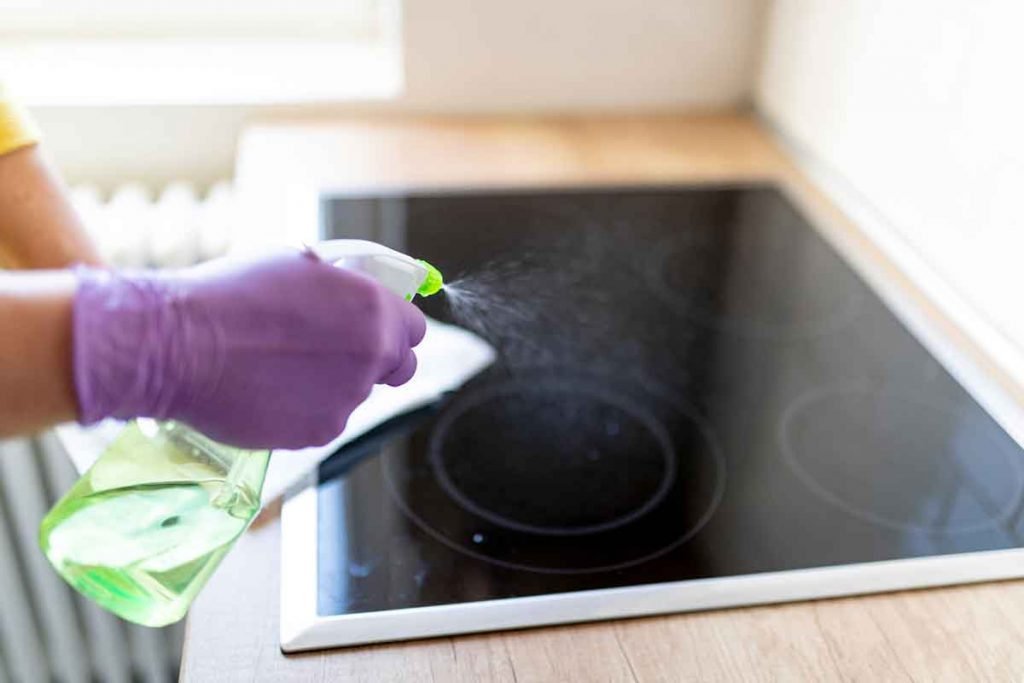Have you noticed a peculiar humming or buzzing sound while using your induction cooktop? Rest assured, these sounds are entirely normal and are a result of various factors. The type and weight of your cookware can be two major culprits. For instance, heavier pans like cast iron with enamel tend to produce little noise compared to lighter stainless steel pans.
Also, the pan size and the food it holds can also be a reason for the sound levels. When you use adjacent elements on the induction cooktop at specific power settings, you’re likely to get an intermittent hum or low whistle.
Is that all? What other noises should you expect? What can you do about it? We’ve covered it all here! Read on.
Reasons of Induction Hobs Make High-Pitched Buzzing or Humming Noise
Induction hobs or cooktops can produce high-pitched buzzing or humming noises for various reasons. These include:
- Electromagnetic Fields – Induction cooktops work by generating electromagnetic fields to heat the cookware directly. These fields can interact with the metal components of the cookware, causing them to vibrate and produce sounds. The frequency of the vibration determines the pitch of the buzzing or humming noise.
- Power Settings – The intensity of the buzzing or humming noise may vary based on the power settings of the induction hob. Higher power settings can generate stronger magnetic fields and more noticeable sounds.
- Cookware Material and Size – The type and size of the cookware used on the induction hob can influence the noise level. Different materials and thicknesses of cookware can respond differently to the magnetic fields, resulting in different degrees of noise.
- Pan Interaction – When using multiple cooking zones simultaneously, the magnetic fields from these zones can interact and create noises. Adjusting the power levels or using cookware that covers the entire cooking zone can help reduce this effect.
- Cooling Fans: Some induction hobs have built-in cooling fans to prevent overheating. These fans can also produce low-humming sounds during operation.
Do all Induction Cooktops Make a Buzzing or Humming Sound?
No, not all induction cooktops make a buzzing or humming noise. While some induction cooktops may produce slight buzzing or humming sounds during operation, it’s not typical of all models.
The presence and intensity of buzzing or humming noises can vary based on several factors, including the design and construction of the induction cooktop, the quality of the components used, and the specific cooking settings used. Higher-quality induction cooktops often employ advanced technology and better insulation to reduce operating noise.
Some manufacturers incorporate features such as improved cooling systems to further minimize any sounds during cooking. The type and size of cookware used can also influence the noise level. Different materials and thicknesses of cookware can interact differently with the electromagnetic fields, leading to varying degrees of noise.
How Much Noise Does an Induction Stovetop Make?
The amount of noise produced by an induction cooktop can vary based on the specific model, brand, and cooking settings being used. In general, induction cooktops are known for being relatively quiet compared to traditional gas or electric stovetops. You’ll find that the noise levels are usually within an acceptable range and won’t disrupt you, even if you’re reading a book in the kitchen waiting for your meal to cook.
The main source of noise in an induction cooktop comes from the electromagnetic fields and the interaction with the cookware. The noise is often considered a normal part of the induction cooking process, and it doesn’t affect the performance or efficiency of the cooktop.
What Are the Different Types of Induction Cooktop Noises?
When using an induction cooktop, you’ll likely come across different types of sounds. Most are normal, but it’s always good to have some knowledge of what they are and what they mean.
Let’s take a closer look at the different noises you may hear while cooking with an induction cooktop:
Humming Sounds
One of the common noises experienced when using an induction cooktop is a low humming sound, especially on high-power settings. This humming is normal and is mainly caused by the energy transmitted from the cooktop to the cookware. As the cookware heats up, the humming sound may reduce or disappear. The induction hob is equipped with a fan, which activates during cooking to dissipate the generated heat and maintain a controlled temperature for precise cooking. The fan’s various speeds correspond to the detected temperature, and it may continue to run even after the cooktop is turned off to regulate high temperatures.
At times, when using adjacent elements with specific power settings, noise from the pan may interact, resulting in a low whistle or intermediate humming sound.
Tick Sounds
You might notice very soft tick sounds while using the induction cooktop from time to time. These sounds occur when the power controllers cycle the elements on and off to maintain steady and stable element power.
Buzzing, Crackling, or Rattling Sound
Cookware made of different materials can lead to crackling or rattling sounds during cooking. These noises result from vibrations in the joint faces between the layers of the cookware. The sound may vary depending on the type of food you’re cooking, the cookware’s size, and the cookware material.
Lightweight cookware, such as stainless steel and stainless steel, tends to produce more noise. Some cookware, especially lower-quality clad cookware, might have layers that are not securely welded, causing a buzzing sound, especially at high-power settings. While the noise is not overly loud, it can be somewhat bothersome.
Loose Fitting Handles and Pans with Uneven Bottoms
The loose fitting handles of cookware, especially when riveted, and lighter weight lids can cause slight vibrations. This can be worse, especially at high-power settings. Also, pans with irregular bottoms might vibrate on the glass surface, resembling the sound of a buzzing bee.
Condensation Sounds
During cooking, pans might trap residual moisture or condensation. As the moisture boils off while in contact with the flat cooktop, it tends to produce some beeping noise that’s irritating. This is especially true when water vapor comes into contact with a cold surface, and the vapor turns into water droplets.
How Do I Reduce My Induction Stovetop Noises?
Do you find the noise produced during cooking bothersome? Don’t worry, you can reduce some of the noise you’ve seen above or eradicate it completely. Here’s how you can do it:
- Lower the Temperature – Cooking at higher temperatures on an induction cooktop can lead to increased noise levels. To reduce noise, try lowering the temperature while cooking. This will not only provide a more stable heat but also help in minimizing the noise produced.
- Use Heavy Pots – Go for heavier cookware, such as cast iron pots and pans, to reduce excessive noise. Heavy cookware tends to produce fewer vibrations and remains steady during cooking, resulting in minimal noise. Heavier cookware covers the heating element entirely, reducing or eliminating vibrations and potential whistling sounds.
- Use One-Piece Cookware – Consider using one-piece cookware, like carbon steel pans, cast iron skillets, or enameled steel pans. These utensils can significantly reduce noise emissions during cooking.
- Use Large Cookware – Choose cookware that fully covers the induction cooktop’s heating element. When using small cookware that doesn’t cover the entire element, it can cause vibrations and result in whistling sounds.
- Avoid Loose-Fitting Handles – Cooking with cookware that has loose-fitting handles or lids can lead to vibrations during the cooking process, contributing to unwanted noise.
- Opt Optimal Power Level – Using high power settings with lightweight cookware can lead to buzzing sounds. Opt for intermediate power settings that are suitable for cooking and do not generate unwanted sounds.
Final Thoughts
The humming or buzzing sounds emitted by induction cooktops are a natural and expected part of their operation. These noises usually come due to several factors, including the life span of the induction, the transmission of energy from the appliance to the cookware, the functioning of the embedded fan to dissipate heat, and the power controllers cycling the elements on and off. The type and quality of cookware used can also influence the level of noise produced.
While these noises might be slightly bothersome to some users, it’s important to understand that they do not indicate any defects or malfunctions in the induction cooktop. Instead, they are a result of the precise and efficient electromagnetic cooking process that induction cooktops employ. To minimize these noises, adopt the strategies we have covered above, such as using heavy and one-piece cookware, selecting the appropriate power levels, and ensuring a secure fit of lids and handles. By following these tips, you can create a quieter and more enjoyable cooking experience with their induction stovetops.



